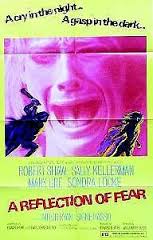
A REFLECTION OF FEAR
US, 1971, 89 minutes, Colour.
Robert Shaw, Sally Kellerman, Mary Ure, Sondra Locke, Signe Hasso.
Directed by William A. Fraker.
Reflection of Fear is a stylish thriller but no masterpiece; rather an exotic experience in atmospheric eeriness. Camerawork and colour are used in contrived ways to make the audience absorb the claustrophobic world of grandmother, mother and daughter, three women who live in baroque isolation in Canada. The solitary world of the daughter is broken by the return of her father and we soon have three murders and a quick resolution, cousin to "Psycho". A fine cast including Robert Shaw, Mary Ure, Sondra Locke, Signe Hasso and Sally Kellerman do more than justice to a film which would give strong support in a double programme.
1. The implications of the title? The use. of colour,, baroque and Gothic effects, claustrophobic atmosphere? How well were these used for the film? Was it a good psychological thriller? Or merely conventional and sensational? Why?
2. How well did the film focus on Marguerite? Was she an attractive character to the audience? Did the audience allow her her isolation and solitude, her talking to a friend and a horse? The eeriness of the atmosphere and its loneliness? Did the film suggest madness? Her preoccupation with studies botany etc.?
3. How was Marguerite a victim of her mother's and grandmother's world? The influence of mother and grandmother? The women in themselves and their relationship? Eerie and baroque? Isolated and man-fearing? Was there a love in this household? Julia's response to Michael's return and to Anne? The question of a divorce? The influence of the grandmother?
4. How did Michael and Anne compare in normality with this enclosed world? How well did the film portray the clash between normal and abnormal? Was the audience meant to have sympathy with Michael. and Anne? Or were they disruptive of the solitude world?
5. How did the wider outside world contrast with the home? How normal did it seem? How important was its representation to balance the solitude world?
6. What was Marguerite's reaction to her father's presence? Love? Mystery?
7. How did the clash between normality and abnormality cause disruption, especially the meeting at the gate?
8. Audiences prepared for the deaths? Did you suspect what happened? Why? Were the deaths appropriately brutal for this film? Over-brutal?
9. Were the investigation sequences important for the plot?
10. The importance of the motel-owner's son and his lust after Marguerite, the reality of his death? What motivated this? What insight did it give into the other deaths?
11. How successful, dramatically, was the attempt on Anne's life? Was it appropriately melodramatic or overdone?
12. What did the tone of the funeral and sadness add to the film? In preparation for the final revelation?
13. How sinister did Marguerite's talking with her friend become by the end of the film? Why?
14. was the audience prepared for the final revelation? Was it expected? What comment on the mad world did this revelation give? Insight into mother and grandmother, and their victimisation of Marguerite?